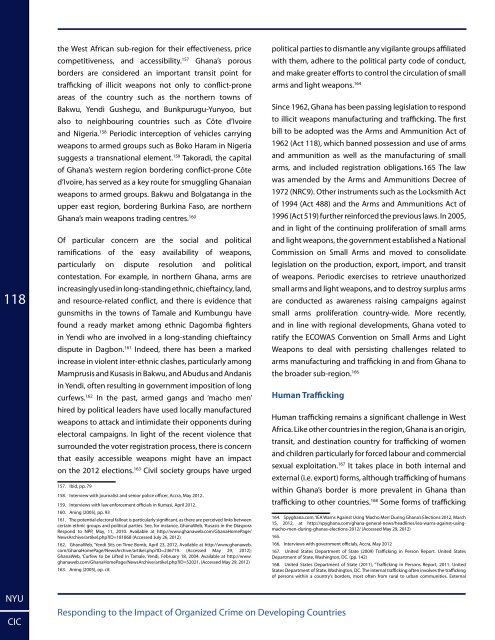here - Center on International Cooperation - New York University
here - Center on International Cooperation - New York University
here - Center on International Cooperation - New York University
Create successful ePaper yourself
Turn your PDF publications into a flip-book with our unique Google optimized e-Paper software.
118<br />
the West African sub-regi<strong>on</strong> for their effectiveness, price<br />
competitiveness, and accessibility. 157 Ghana’s porous<br />
borders are c<strong>on</strong>sidered an important transit point for<br />
trafficking of illicit weap<strong>on</strong>s not <strong>on</strong>ly to c<strong>on</strong>flict-pr<strong>on</strong>e<br />
areas of the country such as the northern towns of<br />
Bakwu, Yendi Gushegu, and Bunkpurugu-Yunyoo, but<br />
also to neighbouring countries such as Côte d’Ivoire<br />
and Nigeria. 158 Periodic intercepti<strong>on</strong> of vehicles carrying<br />
weap<strong>on</strong>s to armed groups such as Boko Haram in Nigeria<br />
suggests a transnati<strong>on</strong>al element. 159 Takoradi, the capital<br />
of Ghana’s western regi<strong>on</strong> bordering c<strong>on</strong>flict-pr<strong>on</strong>e Côte<br />
d’Ivoire, has served as a key route for smuggling Ghanaian<br />
weap<strong>on</strong>s to armed groups. Bakwu and Bolgatanga in the<br />
upper east regi<strong>on</strong>, bordering Burkina Faso, are northern<br />
Ghana’s main weap<strong>on</strong>s trading centres. 160<br />
Of particular c<strong>on</strong>cern are the social and political<br />
ramificati<strong>on</strong>s of the easy availability of weap<strong>on</strong>s,<br />
particularly <strong>on</strong> dispute resoluti<strong>on</strong> and political<br />
c<strong>on</strong>testati<strong>on</strong>. For example, in northern Ghana, arms are<br />
increasingly used in l<strong>on</strong>g-standing ethnic, chieftaincy, land,<br />
and resource-related c<strong>on</strong>flict, and t<str<strong>on</strong>g>here</str<strong>on</strong>g> is evidence that<br />
gunsmiths in the towns of Tamale and Kumbungu have<br />
found a ready market am<strong>on</strong>g ethnic Dagomba fighters<br />
in Yendi who are involved in a l<strong>on</strong>g-standing chieftaincy<br />
dispute in Dagb<strong>on</strong>. 161 Indeed, t<str<strong>on</strong>g>here</str<strong>on</strong>g> has been a marked<br />
increase in violent inter-ethnic clashes, particularly am<strong>on</strong>g<br />
Mamprusis and Kusasis in Bakwu, and Abudus and Andanis<br />
in Yendi, often resulting in government impositi<strong>on</strong> of l<strong>on</strong>g<br />
curfews. 162 In the past, armed gangs and ‘macho men’<br />
hired by political leaders have used locally manufactured<br />
weap<strong>on</strong>s to attack and intimidate their opp<strong>on</strong>ents during<br />
electoral campaigns. In light of the recent violence that<br />
surrounded the voter registrati<strong>on</strong> process, t<str<strong>on</strong>g>here</str<strong>on</strong>g> is c<strong>on</strong>cern<br />
that easily accessible weap<strong>on</strong>s might have an impact<br />
<strong>on</strong> the 2012 electi<strong>on</strong>s. 163 Civil society groups have urged<br />
157. Ibid, pp. 79<br />
158. Interview with journalist and senior police officer, Accra, May 2012.<br />
159. Interviews with law enforcement officials in Kumasi, April 2012.<br />
160. Aning (2005), pp. 93<br />
161. The potential electoral fallout is particularly significant, as t<str<strong>on</strong>g>here</str<strong>on</strong>g> are perceived links between<br />
certain ethnic groups and political parties. See, for instance, GhanaWeb, ‘Kusasis in the Diaspora<br />
Resp<strong>on</strong>d to NPP, May, 11, 2010. Available at http://www.ghanaweb.com/GhanaHomePage/<br />
<strong>New</strong>sArchive/artikel.php?ID=181868 (Accessed July 26, 2012)<br />
162. GhanaWeb, ‘Yendi Sits <strong>on</strong> Time Bomb, April 23, 2012. Available at http://www.ghanaweb.<br />
com/GhanaHomePage/<strong>New</strong>sArchive/artikel.php?ID=236719. (Accessed May 29, 2012);<br />
GhanaWeb, ‘Curfew to be Lifted in Tamale, Yendi, February 18, 2004. Available at http://www.<br />
ghanaweb.com/GhanaHomePage/<strong>New</strong>sArchive/artikel.php?ID=52021, (Accessed May 29, 2012)<br />
163. Aning (2005), op. cit.<br />
political parties to dismantle any vigilante groups affiliated<br />
with them, ad<str<strong>on</strong>g>here</str<strong>on</strong>g> to the political party code of c<strong>on</strong>duct,<br />
and make greater efforts to c<strong>on</strong>trol the circulati<strong>on</strong> of small<br />
arms and light weap<strong>on</strong>s. 164<br />
Since 1962, Ghana has been passing legislati<strong>on</strong> to resp<strong>on</strong>d<br />
to illicit weap<strong>on</strong>s manufacturing and trafficking. The first<br />
bill to be adopted was the Arms and Ammuniti<strong>on</strong> Act of<br />
1962 (Act 118), which banned possessi<strong>on</strong> and use of arms<br />
and ammuniti<strong>on</strong> as well as the manufacturing of small<br />
arms, and included registrati<strong>on</strong> obligati<strong>on</strong>s.165 The law<br />
was amended by the Arms and Ammuniti<strong>on</strong>s Decree of<br />
1972 (NRC9). Other instruments such as the Locksmith Act<br />
of 1994 (Act 488) and the Arms and Ammuniti<strong>on</strong>s Act of<br />
1996 (Act 519) further reinforced the previous laws. In 2005,<br />
and in light of the c<strong>on</strong>tinuing proliferati<strong>on</strong> of small arms<br />
and light weap<strong>on</strong>s, the government established a Nati<strong>on</strong>al<br />
Commissi<strong>on</strong> <strong>on</strong> Small Arms and moved to c<strong>on</strong>solidate<br />
legislati<strong>on</strong> <strong>on</strong> the producti<strong>on</strong>, export, import, and transit<br />
of weap<strong>on</strong>s. Periodic exercises to retrieve unauthorized<br />
small arms and light weap<strong>on</strong>s, and to destroy surplus arms<br />
are c<strong>on</strong>ducted as awareness raising campaigns against<br />
small arms proliferati<strong>on</strong> country-wide. More recently,<br />
and in line with regi<strong>on</strong>al developments, Ghana voted to<br />
ratify the ECOWAS C<strong>on</strong>venti<strong>on</strong> <strong>on</strong> Small Arms and Light<br />
Weap<strong>on</strong>s to deal with persisting challenges related to<br />
arms manufacturing and trafficking in and from Ghana to<br />
the broader sub-regi<strong>on</strong>. 166<br />
Human Trafficking<br />
Human trafficking remains a significant challenge in West<br />
Africa. Like other countries in the regi<strong>on</strong>, Ghana is an origin,<br />
transit, and destinati<strong>on</strong> country for trafficking of women<br />
and children particularly for forced labour and commercial<br />
sexual exploitati<strong>on</strong>. 167 It takes place in both internal and<br />
external (i.e. export) forms, although trafficking of humans<br />
within Ghana’s border is more prevalent in Ghana than<br />
trafficking to other countries. 168 Some forms of trafficking<br />
164. Spyghana.com, ‘IEA Warns Against Using ‘Macho Men’ During Ghana’s Electi<strong>on</strong>s 2012, March<br />
15, 2012, at http://spyghana.com/ghana-general-news/headlines/iea-warns-against-usingmacho-men-during-ghanas-electi<strong>on</strong>s-2012/<br />
(Accessed May 29, 2012)<br />
165.<br />
166. Interviews with government officials, Accra, May 2012<br />
167. United States Department of State (2009) Trafficking in Pers<strong>on</strong> Report. United States<br />
Department of State, Washingt<strong>on</strong>, DC. (pp. 142)<br />
168. United States Department of State (2011), “Trafficking in Pers<strong>on</strong>s Report, 2011. United<br />
States Department of State, Washingt<strong>on</strong>, DC. The internal trafficking often involves the trafficking<br />
of pers<strong>on</strong>s within a country’s borders, most often from rural to urban communities. External<br />
NYU<br />
CIC<br />
Resp<strong>on</strong>ding to the Impact of Organized Crime <strong>on</strong> Developing Countries
















